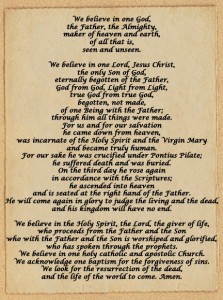- Feb 5, 2002
- 166,342
- 56,056
- Country
- United States
- Faith
- Catholic
- Marital Status
- Married
- Politics
- US-Others
As a Protestant, I went to an Evangelical church that changed an important and historical word in the Apostles Creed. Instead of the “holy, catholic Church,” we were the “holy, Christian church.” At the time, I thought nothing of it. There was certainly no evil intent, just a loathing of the Catholic Church and a distinct desire to distance ourself from its heresy and man-made traditions.
I assumed that early on Catholics deviated from “biblical Christianity” so they simply invented a new word to describe their new society. Since we Evangelicals were supposedly the ones faithful to the Bible we had no interest in the word catholic since it was found nowhere between the covers of the Bible. It was a biased word loaded with negative baggage so we removed it from the Creed.
I should have asked myself “Where did the word catholic come from, and what does it mean?” Was I right to assume that Roman Catholics invented the word to set themselves apart from biblical Christianity?
A short and interesting investigation will turn up some valuable information. Let’s start with an understanding of doctrinal development and the definition of catholic, then let’s “interview” the very first Christians to see what they thought of the Church and the word catholic and then we will study the Bible itself.
How Doctrines and Words Develop
The development of doctrine is not just a Catholic phenomenon. It is also a fact among Protestants and all religions or theological traditions. Over time, theological words develop to help explain the deeper understanding of the faith. As Christians ponder the revelation passed on by the apostles and deposited in his Church the Church mulls over God’s Word, thinking deeper and deeper. It is not unlike peeling the layers away from an onion as one goes deeper to the heart.
Development of doctrine defines, sharpens, and interprets the deposit of faith. The Bible is not a theological textbook or a detailed church manual, such as say a catechism or study guide. The Bible’s meaning is not always clear as St. Peter tells us (2 Pet 3:15?16). Thirty-three thousand competing Protestant denominations also make this fact apparent as they fail to agree on what the Bible says. It takes the authority of a universal Church and the successors of the apostles to formulate the doctrines of the faith. As an Evangelical, I was naïve enough to think I could recreate the “theological” wheel for myself.
Continued below.

 catholicconvert.com
catholicconvert.com
I assumed that early on Catholics deviated from “biblical Christianity” so they simply invented a new word to describe their new society. Since we Evangelicals were supposedly the ones faithful to the Bible we had no interest in the word catholic since it was found nowhere between the covers of the Bible. It was a biased word loaded with negative baggage so we removed it from the Creed.
I should have asked myself “Where did the word catholic come from, and what does it mean?” Was I right to assume that Roman Catholics invented the word to set themselves apart from biblical Christianity?
A short and interesting investigation will turn up some valuable information. Let’s start with an understanding of doctrinal development and the definition of catholic, then let’s “interview” the very first Christians to see what they thought of the Church and the word catholic and then we will study the Bible itself.
How Doctrines and Words Develop
The development of doctrine is not just a Catholic phenomenon. It is also a fact among Protestants and all religions or theological traditions. Over time, theological words develop to help explain the deeper understanding of the faith. As Christians ponder the revelation passed on by the apostles and deposited in his Church the Church mulls over God’s Word, thinking deeper and deeper. It is not unlike peeling the layers away from an onion as one goes deeper to the heart.
Development of doctrine defines, sharpens, and interprets the deposit of faith. The Bible is not a theological textbook or a detailed church manual, such as say a catechism or study guide. The Bible’s meaning is not always clear as St. Peter tells us (2 Pet 3:15?16). Thirty-three thousand competing Protestant denominations also make this fact apparent as they fail to agree on what the Bible says. It takes the authority of a universal Church and the successors of the apostles to formulate the doctrines of the faith. As an Evangelical, I was naïve enough to think I could recreate the “theological” wheel for myself.
Continued below.

What Does the Word Catholic Mean? A History of the Word "Catholic" – Defenders of the Catholic Faith
Save As a Protestant, I went to an Evangelical church that changed an important and historical word in the Apostles Creed. Instead of the “holy, catholic Church,” we were the “holy, Christian church.” At the time, I thought nothing of it. There was certainly no evil intent, just a loathing of...
